How to rebuild a city with Karam Alkatlabe

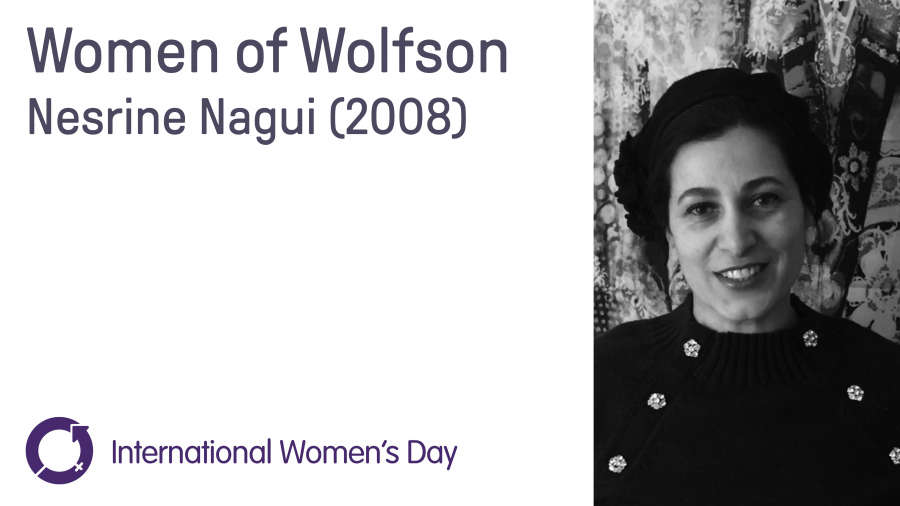
For the second of our Women in Wolfson features for International Women's Day, Awa Farah (MPhil African Studies, 2017) had a chat with alumna Nesrine Nagui (MPhil Engineering, 2008) on her new job at the US Department of Defense, her Foundation and her inspirations.

How did you come to study at Wolfson College?
In 2004, when my third child was born, I stepped aside from work I loved to raise my family. I was lead mechanical engineer and fire protection specialist for an International Bechtel Power Subsidiary — a company where I had been for 12 years and was the only female engineer in the founding team. It was a tough decision.
In 2007, interested in pursuing a PhD and a career in research, I became increasingly fascinated by controlling the properties of materials at the nanoscale. I began to apply for PhD research positions. In the process, I fell in love with Cambridge University and was awarded a Cambridge Overseas Trust scholarship. Wolfson was my College of choice!
What is your current occupation and how did you get into this role?
I currently wear many hats that span engineering, research and policy pertaining to women’s economic security and education.
I have recently accepted a position with the US Department of Defense. However, I am also the founder and CEO of the Foundation for American and Global Advancement where my focus is supporting women, in particular moms, returning to the STEM workforce. When returning, myself, I came across many challenges that face women returners. I decided that I wanted to make an impact and facilitate women’s abilities to balance a life and family they love with careers they worked hard to achieve.
What do you most enjoy about your job?
I enjoy bringing people with diverse skill sets together to solve challenging problems that would not be otherwise addressed without an interdisciplinary team. I must credit this to my research at Cambridge. My supervisor had just been seconded to the MOD when I joined the university. I also designed a research project that was very interdisciplinary, involving many facets of science (plasmonics, colloidal systems, biological systems). To make it a success, I drew on knowledge from researchers in labs across the world and became fascinated with the power of sharing knowledge to break barriers. In science, collaborations and sharing ideas is imperative to advancement.
What is the best piece of advice you’ve ever been given?
“This thing we call Failure is not the falling down, but the staying down.” I came across this quote by Mary Pickford, the first time I stumbled and felt lost, and have lived by it. When you face your very first REAL challenge, it is very easy to lose your bearings. BUT we must always remember that life is all about challenges and it is really those challenges that help shape us and build us into stronger people. Resilience is key!
Which female (living or historical) has inspired you the most?
Growing up I was inspired by Marie Curie. She was the only female scientist in our school books. We need to celebrate more women in STEM, and other fields of course, so that younger women have diverse female role models.
On a personal level, my mom. She wanted to travel away to college, but her father was concerned with her travelling alone. With my father, she pushed my two sisters and I to accomplish career aspirations she was not able to; she sees her success in ours. I try to live up to her achievements as a mother and homemaker.
In line with this year’s International Women’s Day theme #balanceforbetter, how would you define balance?
I define balance as enabling individuals to be all they want to be; well-rounded people. One very dangerous thing we do is stereotype and put people into molds. “You are a mom, so you need to stay home and look after your kids.” “You are a researcher so need to get you PhD before age X and publish Y number of papers by Z time in your life”, etcetera. This holds women back, A LOT! Moms acquire a multitude of soft skills while raising kids that could take years to teach at work. We must create the space for women to come into and out of academia and the workforce, to be balanced, for a better world. By limiting women to specific roles, we are eliminating fifty percent of the population that might have the next cure to cancer or Alzheimer’s. More so, we are limiting their economic security and that of the people they care for!
It is important to remember that our diverse experiences help bring unique angles to our problem-solving abilities and that is #balanceforbetter.
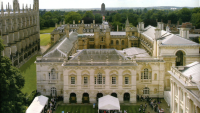
Join Emeritus Fellow Dr Brian D Cox for a talk which will delve into understanding the functioning of a collegiate university.
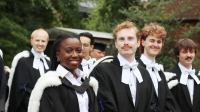
Graduation ceremonies are the culmination of students’ hard work and commitment, and a moment to celebrate the completion of their Cambridge degree.
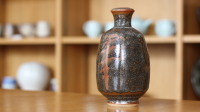
A display of works from the Bradshaw-Bubier studio pottery collection.
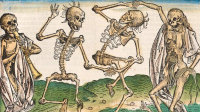
How we can develop ‘death activism’ – a variety of tactics and posthuman practices which celebrate death, its inevitability, its forms, from the slow to times of crisis, and how can trauma and mourning emerge as their own forms of expression, or even activism?
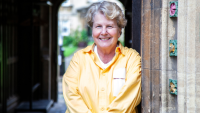
We are delighted to welcome Sandi Toksvig OBE as our speaker for Wolfson's prestigious Lee Lecture this year.







